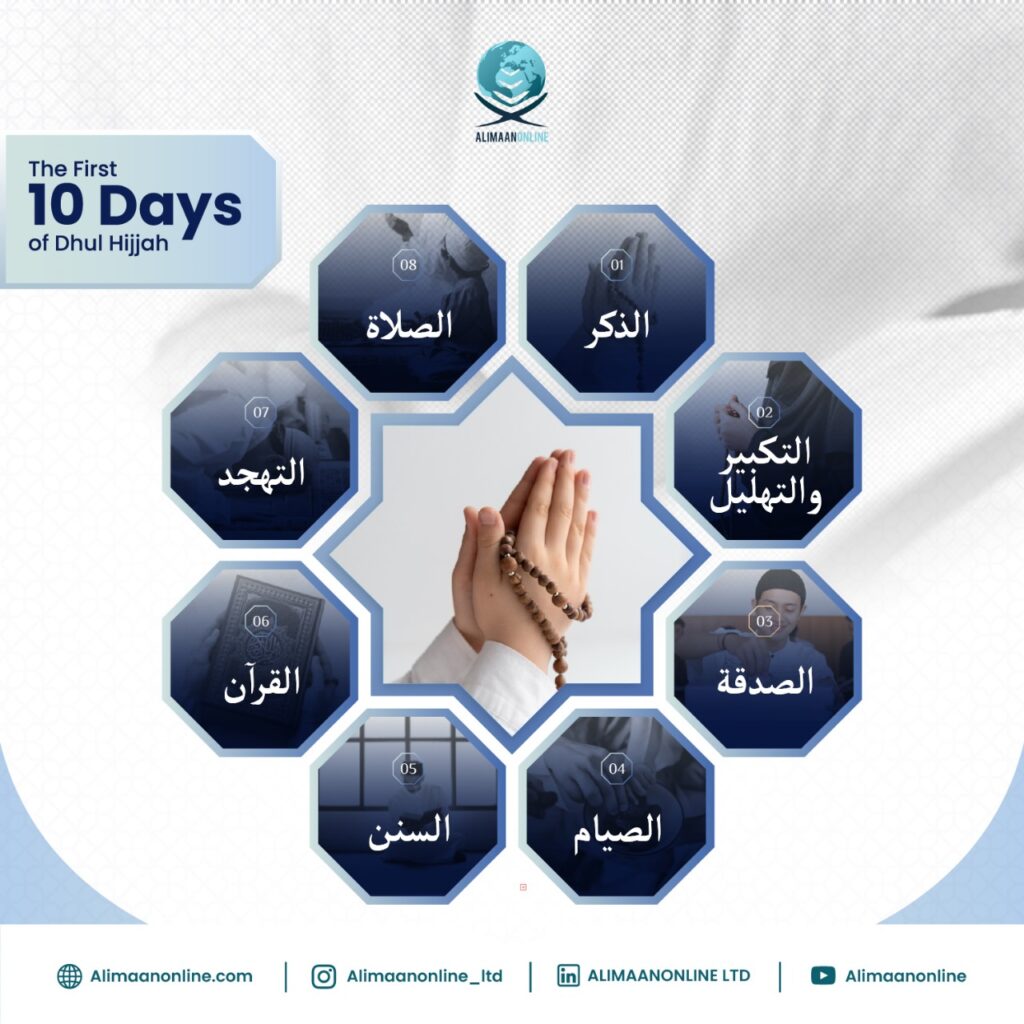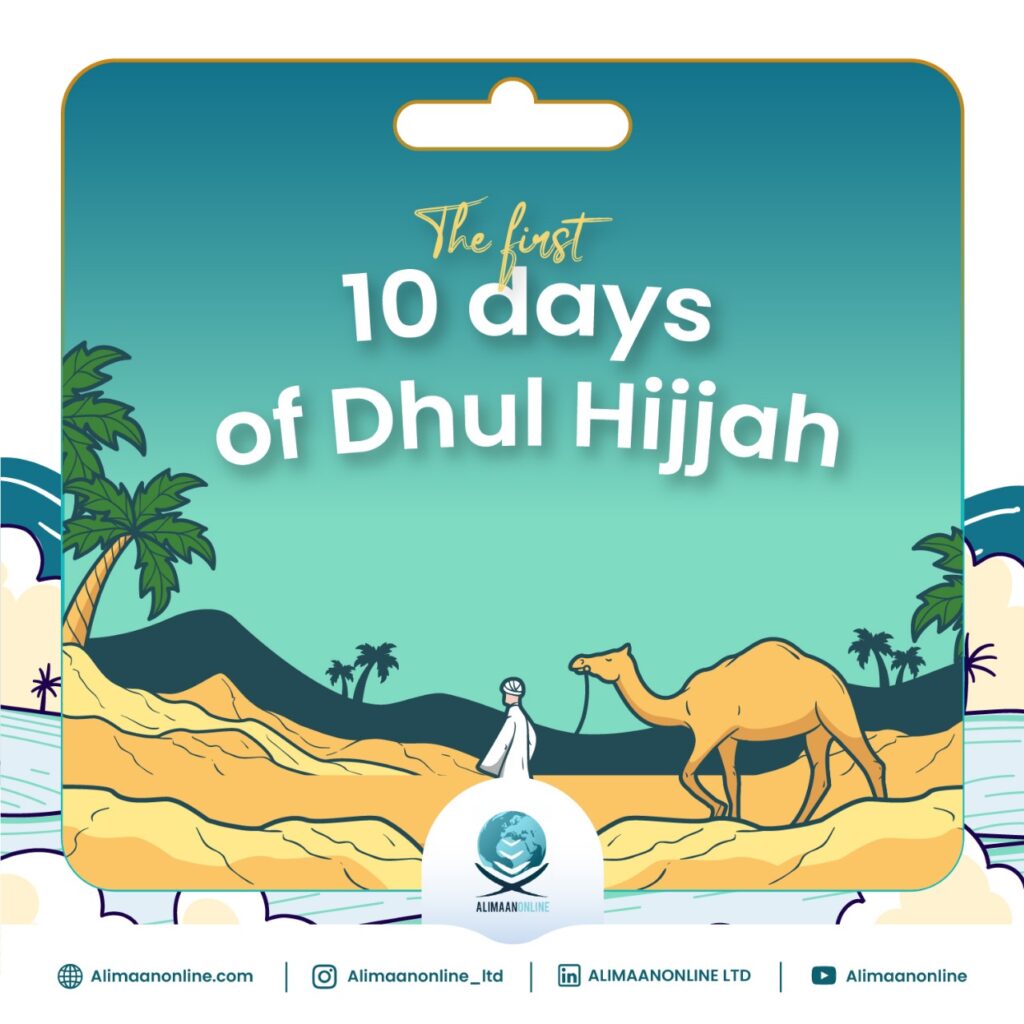Almighty Allah has gifted this Ummah special times throughout the year to gain immense rewards—and the first 10 days of Dhul Hijjah are among the most noble. These days are revered for several reasons, including the Day of Arafah, Hajj, Eid Al-Adha, and more. The Prophet Muhammad ﷺ described them as “the best days of the year.”
During this sacred time, believers are encouraged to fast, especially on the Day of Arafah, increase Dhikr (remembrance of Allah), perform acts of worship, offer Udhiya (sacrifice), and—if possible—undertake the journey of Hajj. Let’s explore the virtues of these blessed days and practical steps we can take to make the most of them.
What Does Dhul Hijjah Mean?
Dhul Hijjah (ذُو ٱلْحِجَّة) is the 12th and final month of the Islamic (Hijri) calendar and one of the four sacred months in Islam. The term “Dhul Hijjah” means “the month of pilgrimage,” referring to the Hajj, which is performed by millions of Muslims in Makkah during this time.
When is Dhul Hijjah 2025?
Dhul Hijjah 1446H is expected to begin on Wednesday, May 28, 2025, and end on Wednesday, June 25, 2025, depending on the sighting of the moon in different regions. This means the first ten days of Dhul Hijjah—the most virtuous period—are expected to span from May 28 to June 6, 2025.
Why Are the First 10 Days of Dhul Hijjah So Important?
The first ten days of Dhul Hijjah are unlike any other days in the year. Let’s examine some key reasons why they are so highly esteemed:
1. They Fall Within a Sacred Month
Dhul Hijjah is one of the four sacred months (أشهر حرم) designated by Allah:
“The year is twelve months, of which four are sacred: three consecutive months—Dhul-Qa’dah, Dhul-Hijjah, and Muharram—and (the fourth is) Rajab.”
(Sahih al-Bukhari: 3197)
Acts of worship performed during sacred months are multiplied in reward, and sin carries greater weight—highlighting the importance of observing piety.
2. Allah Swears by These Days in the Quran
“By the dawn. And by the ten nights.”
(Surah Al-Fajr, 89:1–2)
According to many early scholars—including Ibn Abbas (RA), Mujahid (RA), and Ibn Zubayr (RA)—these “ten nights” refer to the first ten days of Dhul Hijjah. Ibn Kathir (RA) described this interpretation as the correct opinion in his Tafsir.
3. They Are the Best Days of the Year
The Prophet Muhammad ﷺ said:
“There are no days in which righteous deeds are more beloved to Allah than these ten days.”
(Sahih Bukhari)
Another narration by Jabir (RA) records the Prophet ﷺ saying:
“There is no better day to Allah than the ten days of Dhul Hijjah.”
(Sahih I4. These Days Include Multiple Virtuous OccasionsThese ten days encompass:
- The Day of Arafah (9th Dhul Hijjah)
- Eid al-Adha (10th Dhul Hijjah)
- The days of Hajj
- The days of Tashreeq (11th–13th Dhul Hijjah)
Each of these days carries its own reward and significance, further elevating the entire first ashra (10 days) of Dhul Hijjah.bn Hibban)

10 Rewardable Actions for the First 10 Days of Dhul Hijjah
These sacred days provide a golden opportunity to earn immense rewards. Below are ten acts of worship to help you seize this time:
1. Perform Hajj and Umrah (If Able)
Performing Hajj during Dhul Hijjah is one of the five pillars of Islam. Allah says:
“Pilgrimage to this House is an obligation by Allah upon whoever is able among the people…”
(Surah Aal-e-Imran, 3:97)
The Prophet ﷺ said:
“An accepted Hajj brings no reward except Paradise.”
(Sahih Bukhari)
For those unable to perform Hajj, supporting pilgrims or learning about its rituals is still rewarding.
2. Fast the First Nine Days—Especially the Day of Arafah
Fasting during these days, particularly the Day of Arafah, is a highly recommended Sunnah for non-pilgrims.
The Prophet ﷺ said:
“Fasting the day of Arafah expiates the sins of the previous year and the coming year.”
(Sahih Muslim)
Hafsa (RA), the wife of the Prophet ﷺ, narrated:
“The Prophet ﷺ never missed fasting the first nine days of Dhul Hijjah…”
(Sunan an-Nasa’i)
3. Increase in Dhikr – Especially Takbeer, Tahleel, and Tahmeed
The Prophet ﷺ said:
“Increase in saying: La ilaha ill-Allah, Allahu Akbar, Alhamdulillah, and SubhanAllah in these ten days.”
(Musnad Ahmad)
Examples of Dhikr:
- Takbeer: Allahu Akbar (Allah is the Greatest)
- Tahleel: La ilaha illallah (There is no god but Allah)
- Tahmeed: Alhamdulillah (All praise is due to Allah)
- Tasbeeh: SubhanAllah (Glory be to Allah)
Special Takbeer for Days of Tashreeq (9th–13th):
Allahu Akbar, Allahu Akbar, La ilaha illallah, Allahu Akbar, Allahu Akbar wa Lillahil Hamd
Men should say it aloud; women should say it silently after every obligatory prayer.
4. Engage in Extra Worship (Ibadah)
Use these blessed days to increase:
- Voluntary Salah (especially Tahajjud)
- Quran recitation
- Supplication (Dua)
- Charity and acts of kindness
The Prophet ﷺ compared the reward of good deeds in these days to Jihad and Laylat al-Qadr.
5. Give Charity Generously
Charity holds a multiplied reward during Dhul Hijjah. Support Islamic projects, help those in need, and build ongoing rewards (Sadaqah Jariyah).
Even small actions—like feeding someone or smiling—are acts of charity in Islam.
6. Offer Udhiya (Qurbani/Sacrifice)
Offering Udhiya on Eid al-Adha is a Sunnah Mu’akkadah for those who can afford it. It commemorates the sacrifice of Prophet Ibrahim (AS).
“It is the Sunnah of your father Ibrahim. For every hair, you receive a reward…”
(Tirmidhi)
7. Repent and Seek Forgiveness
These days are an ideal time to turn back to Allah in sincere Tawbah (repentance). Ask for forgiveness with tears and humility.
“O Allah, You are the Most Forgiving and love to forgive, so forgive me.” (Dua of Arafah)
8. Strengthen Family Ties
Reaching out to relatives and mending broken bonds is highly encouraged. The reward is multiplied during these sacred days.
9. Make Lots of Dua (Supplication)
Don’t forget to raise your hands in heartfelt supplication—especially on the Day of Arafah, when dua is most accepted.
“The best supplication is the one made on the Day of Arafah.” (Tirmidhi)
10. Avoid Sins and Bad Habits
As the reward for good deeds increases during these days, so too does the gravity of sins. Be mindful of your actions and strive for righteousness.
Final Thoughts: Make the Most of These Blessed Days
The first 10 days of Dhul Hijjah are a divine gift to every Muslim. Let us not waste this chance to earn Allah’s mercy, blessings, and forgiveness. Whether through fasting, prayer, dhikr, or charity—strive to fill your days with goodness and devotion.
🌙 “So race to (all that is) good.”
(Surah Al-Baqarah, 2:148)
Summary of Sunnah Acts for the First 10 Days of Dhul Hijjah
| Worship Act | Recommended? | Notes |
|---|---|---|
| Hajj | Obligatory (if able) | Among the five pillars of Islam |
| Fasting | Sunnah | Especially on 9th Dhul Hijjah |
| Dhikr (Takbeer, etc.) | Highly Recommended | Recite daily and after prayers |
| Salah & Quran | Highly Recommended | Increase voluntary prayers |
| Udhiya/Qurbani | Sunnah Muakkadah | Done on Eid day |
| Charity | Recommended | Give in the path of Allah |
| Tawbah | Obligatory | Make sincere repentance |

